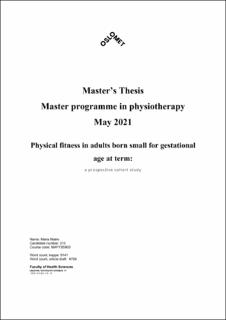Physical fitness in adults born small for gestational age at term: a prospective cohort study
Master thesis
Published version
Permanent lenke
https://hdl.handle.net/11250/2837416Utgivelsesdato
2021Metadata
Vis full innførselSamlinger
Sammendrag
Being born small for gestational age (SGA) at term increases the risk of adverse health outcomes though life. Furthermore, physical fitness is closely linked to health and is important in the prevention of morbidity and mortality. Adequate physical fitness may therefore be particularly important for those born SGA at term. Moreover, reduced birth weight has been reported to be associated with reduced physical fitness in adulthood, but this is little investigated in adults born SGA at term. The aim of this master thesis was therefore to investigate whether physical fitness differ between term-born adults born SGA and term-born adults with normal birth weight.
This prospective cohort study included 107 adults born at term between 1986-1988; 46 were born SGA (22 women, 24 men) and 61 were born with normal birth weight (35 women, 26 men). Physical fitness was assessed by grip strength, 40-second modified push-up test and Åstrand-Ryhming step test. Differences in muscular and cardiorespiratory fitness between the groups were analysed using independent samples t-test. Differences in physical fitness were adjusted for height, waist-to-hip ratio and socioeconomic status in a general linear model.
The study showed that there overall was no difference in physical fitness between adults born SGA at term and adults born with normal birth weight at term. When stratified by sex, men in the SGA group had significantly lower grip strength in both hands compared with men in the control group.
The fact that there were few differences in physical fitness among the two groups is encouraging results. This may indicate that adults born SGA may have similar physical fitness compared with the population. However, the lower grip strength found in SGA men may indicate increased risk of negative health outcomes. Promotion of physical activities that enhances the muscular fitness may therefore be beneficial to prevent adverse health outcomes.
